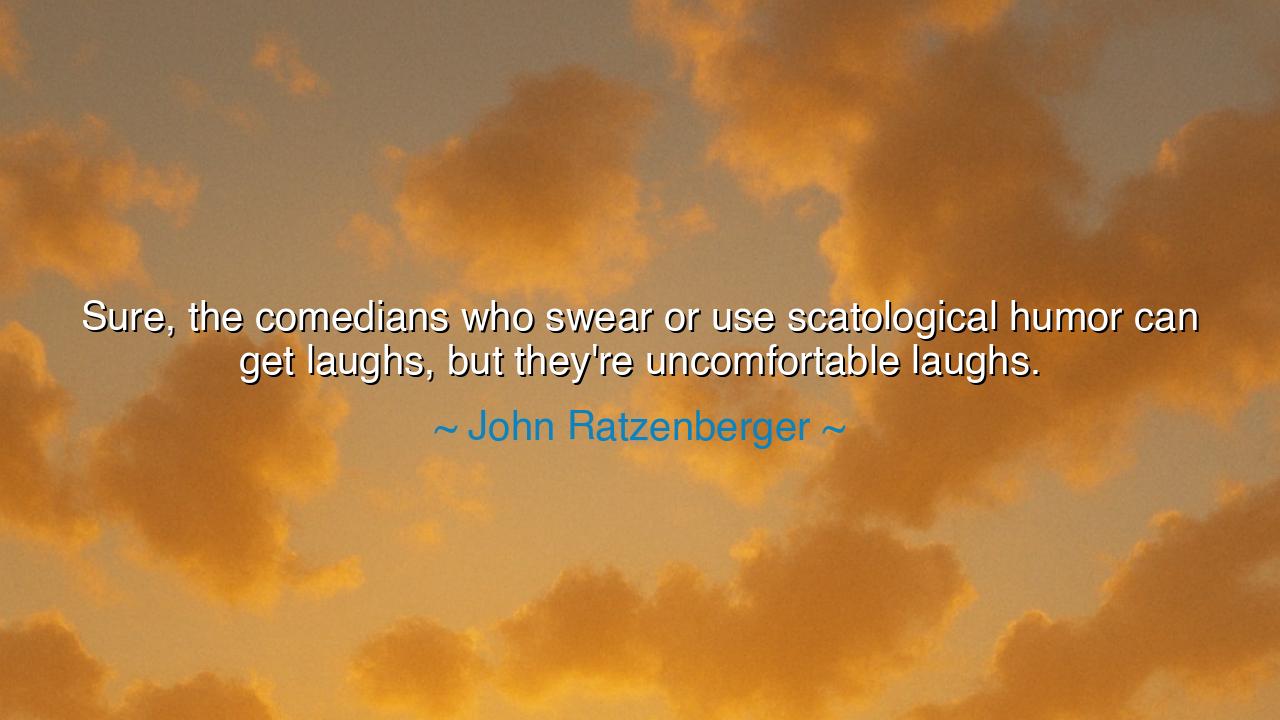
Sure, the comedians who swear or use scatological humor can get
Sure, the comedians who swear or use scatological humor can get laughs, but they're uncomfortable laughs.






The words of John Ratzenberger—“Sure, the comedians who swear or use scatological humor can get laughs, but they're uncomfortable laughs”—carry within them a quiet wisdom about the nature of humor, dignity, and the soul’s response to what it beholds. In these words lies a truth older than the stage, older than the written word itself: that laughter is not all the same. There is laughter that uplifts, and there is laughter that corrodes. There is the laugh of joy, born from recognition and warmth—and there is the laugh of discomfort, born from awkwardness and shame. Ratzenberger speaks not against laughter itself, but against the kind of laughter that costs the spirit its grace.
In the days of ancient Greece, the playwright Aristophanes filled the theatres of Athens with laughter, yet even he knew that wit must serve wisdom. His comedies mocked the follies of men and the arrogance of power, but beneath the jest lay a mirror for the city’s soul. His laughter was not meant to humiliate, but to awaken. Contrast this with those who rely on the crude and the obscene, who mistake shock for wit and vulgarity for courage. Their humor may stir the crowd for a moment, but it leaves behind a strange emptiness—a laughter that tastes of discomfort, that mocks not folly but the sacredness of human dignity.
The “uncomfortable laugh” Ratzenberger speaks of is the laughter that betrays unease—the chuckle that arises not from delight, but from a surrender to social pressure, a fear of appearing humorless. It is laughter that bends the will, not one that frees it. In that moment, the audience is not united by shared joy, but by shared embarrassment. Such laughter wounds the collective spirit. It erodes the subtle harmony that binds humor to humanity. For true humor, like true music, must be attuned to the heart’s highest notes, not its lowest vibrations.
Consider the example of Charlie Chaplin, that gentle genius of the silent age. He needed no vulgar word, no crude gesture, to move the world to laughter and tears. With a mere tilt of his head or stumble of his feet, he revealed the beauty and sorrow of the human condition. His comedy was pure, not because it was sanitized, but because it was honest. It drew laughter that healed, not laughter that harmed. Even amidst poverty and pain, Chaplin made the audience see themselves—not as fools to be mocked, but as souls to be understood. This is the laughter that strengthens, the laughter Ratzenberger esteems.
The power of restraint is the mark of the noble comedian—and indeed, of any noble soul. It is easy to provoke laughter through shock; it is harder to stir the spirit through truth. The vulgar jester reaches for the body; the wise one reaches for the heart. The one depends on surprise; the other depends on insight. Ratzenberger’s words remind us that true humor is rooted in respect, and that every laugh should be a bridge between souls, not a chasm of discomfort. The comedian who understands this serves a sacred art—one that heals divisions and lifts the human spirit closer to its own light.
And yet, his teaching extends beyond the realm of comedy. In all things—speech, art, relationships, work—there lies the same temptation: to reach for what is easy and loud, rather than what is true and good. The man who uses crude jokes to win attention is like the craftsman who builds with straw instead of stone. His work may stand for a day, but it will not endure. The wise, however, seek depth over noise, meaning over shock, and connection over applause. For only the latter build legacies that echo through time.
Let this be the lesson carried to all who would speak, create, or lead: choose humor that uplifts rather than humiliates, speech that enlightens rather than degrades. Seek laughter that brings warmth to the heart, not discomfort to the soul. When you stand before others—whether in jest or in earnest—ask yourself: Does this laughter draw us closer to one another, or does it drive us apart? For the answer to that question is the measure of your integrity.
So remember the wisdom of John Ratzenberger, passed down like an elder’s counsel: The worth of laughter is not in its volume, but in its virtue. Make your words kind, your humor clean, and your spirit radiant. Let your laughter be a gift, not a weapon. Then, and only then, will your voice join the chorus of those whose art—be it comedy or life itself—has become a light for generations to come.






AAdministratorAdministrator
Welcome, honored guests. Please leave a comment, we will respond soon